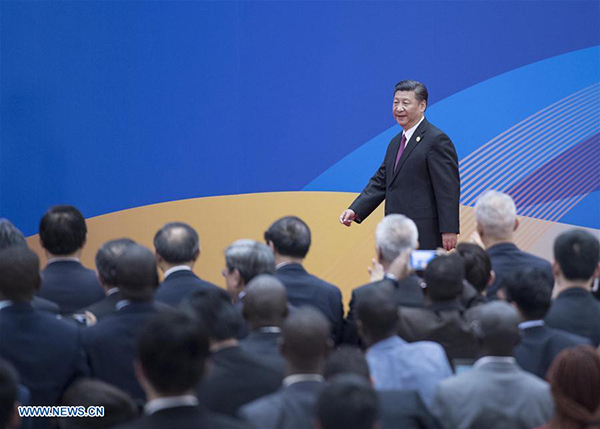Riding on fruitful forum, confident Xi takes Belt & Road to next level

Chinese President Xi Jinping meets the press after the Leaders' Roundtable Summit at the Belt and Road Forum (BRF) for International Cooperation at Yanqi Lake International Convention Center in Beijing, capital of China, May 15, 2017. (Xinhua/Li Tao)
A two-day forum of world leaders ended Monday with promises and high hopes that the Belt and Road Initiative will be the beginning of the building of a better world.
The initiative was first envisioned by Chinese President Xi Jinping in 2013 to create a new platform for international cooperation. Nearly four years later, the plan came to a crucial juncture this past weekend with the Belt and Road Forum for International Cooperation.
Facing dozens of reporters at the scenic Yanqi Lake on the outskirts of Beijing Monday, Xi said the forum -- graced by leaders of 30 countries -- concluded with a positive signal that "all are united behind the initiative, and on course for the shared future of mankind."
"Through the initiative, we hope we can find new driving forces for growth, create a new platform for global development, and re-balance economic globalization," Xi said.
China has rallied support from all over the world to champion globalization and multilateralism at a time when the world's largest economy -- the United States -- retreats to focus on domestic affairs.
The call was well received and not just from the developing world.
Major economies including G7 countries all sent representatives. Also present were people from Brazil, Russia, India and South Africa -- members of the BRICS group; other emerging economies like Indonesia, Mexico, Turkey; and oil-rich Middle Eastern states of Saudi Arabia and United Arab Emirates.
Visiting Russian President Vladimir Putin said the initiative helped boost economic cooperation and exchanges among countries.
The 130 plus countries represented, including the host China, have more than two thirds of the global population. Their combined gross domestic product accounts for 90 percent of the world's total.
"We reached the consensus, set the way forward, and outlined an action plan," Xi told reporters.
According to Xi, 68 countries and international organizations signed cooperation deals with China to carry forward the Belt and Road. Many were inked during the forum.
But the progress did not just end there. Xi said an outcome list of more than 270 items was formulated at the Leaders Roundtable of the forum, setting the way forward.
The roundtable also produced a communique. Among others, it strongly denounces protectionism.
"We reaffirm our shared commitment to build open economy, ensure free and inclusive trade, oppose all forms of protectionism," it says. "We endeavor to promote a universal, rules-based, open, non-discriminatory and equitable multilateral trading system with WTO at its core."
For the future, connectivity remains the centerpiece, Xi said. More land ports and sea ports will be linked into a vast trans-continental transport network.
Countries will also start "soft" connectivity programs to align rules and standards at customs, quality supervision, law enforcement. More industrial parks, economic corridors and capacity cooperation projects will be built. Low-carbon businesses, e-commerce, big data and smart cities will be supported, according to Xi.
A day before, he announced hefty financial support for all these endeavors.
-- 100 billion yuan (about 14.5 billion U.S. dollars) to augment the Silk Road Fund;
-- 380 billion yuan equivalent in loans for infrastructure and development projects from Chinese policy banks;
-- 300 billion yuan to conduct overseas yuan fund businesses;
-- 60 billion yuan in aid to developing countries and international organizations.
Since 2013, the initiative has gone beyond vision and become a reality, delivering real benefits to countries along the routes.
From Mongolia to Malaysia, Thailand to Pakistan and Laos to Uzbekistan, many projects, including high-speed railways, bridges, ports, industrial parks, oil pipelines and power grids, are being built. The living standards of many along the routes have been raised.
UN Secretary-General Antonio Guterres, who attended the forum, gave the scheme the thumbs-up. He told Chinese Foreign Minister Wang Yi that the forum embodies China's uniquely far-sighted, strategic vision and will be key to addressing global problems through international cooperation.
"We will take the Belt and Road to the next level -- broader, deeper and higher," Xi said. "We will be searching for a common solution to solve the big economic challenges of our times."
Calling the initiative a long-term project, the president said it required joint efforts from all parties involved to turn the blueprint into concrete action and measurable outcomes.
World leaders will gather again to gauge the progress in 2019.
"We have every reason to be confident about the future," the president said.


